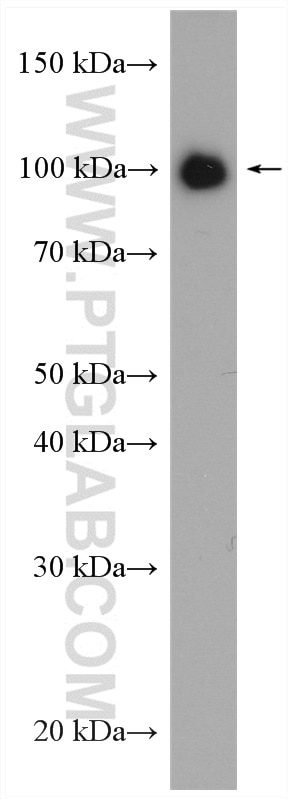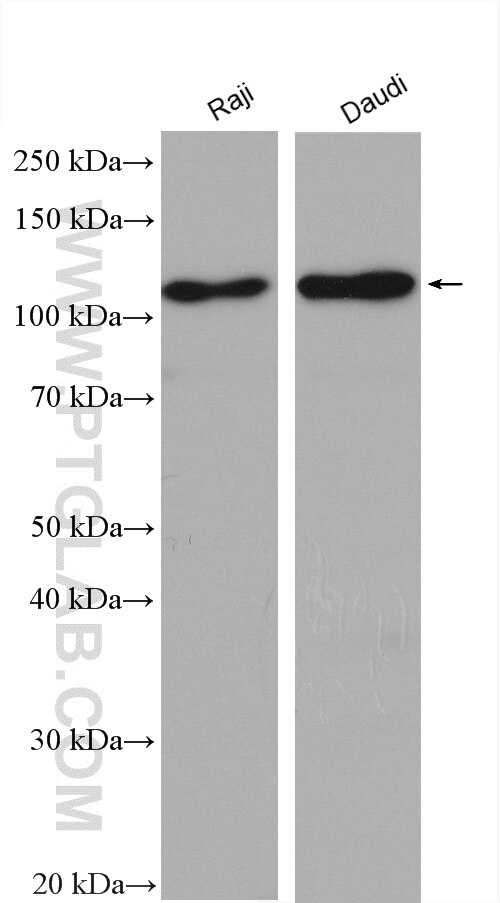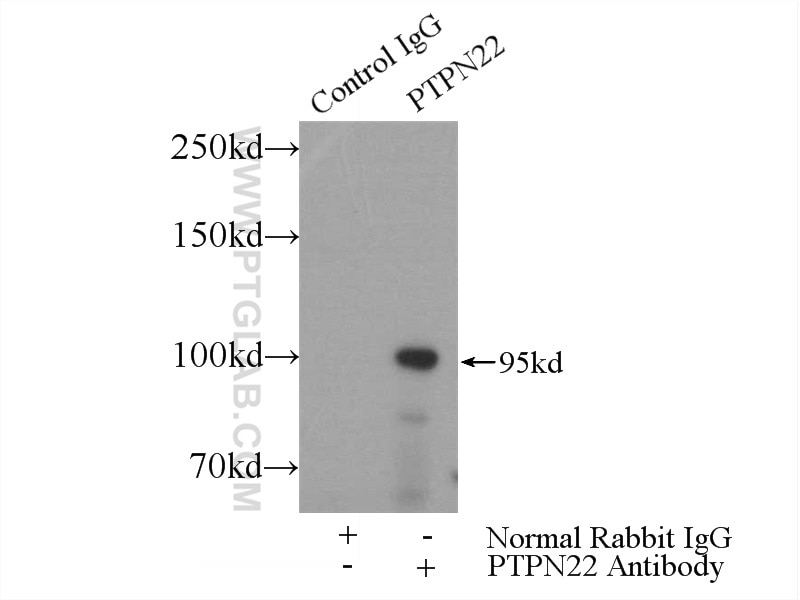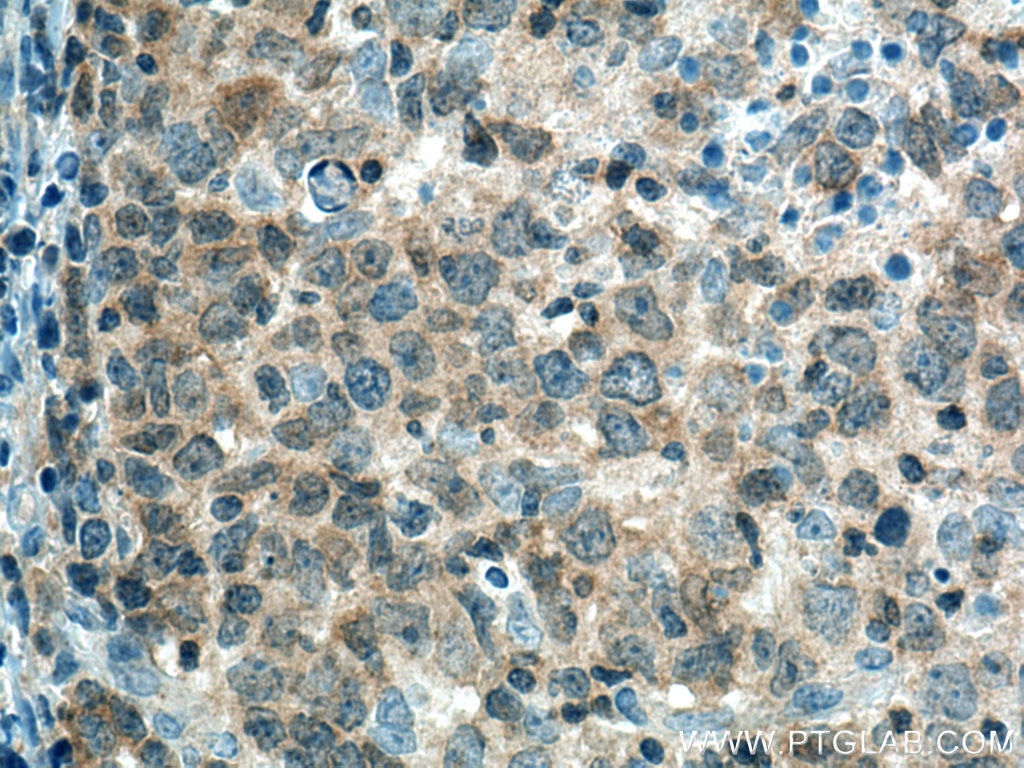PTPN22 Polyklonaler Antikörper
PTPN22 Polyklonal Antikörper für WB, IP, IHC, ELISA
Wirt / Isotyp
Kaninchen / IgG
Getestete Reaktivität
human, Maus, Ratte
Anwendung
WB, IP, IF, IHC, ELISA
Konjugation
Unkonjugiert
Kat-Nr. : 11783-1-AP
Synonyme
Galerie der Validierungsdaten
Geprüfte Anwendungen
| Erfolgreiche Detektion in WB | Daudi-Zellen, Jurkat-Zellen, Raji-Zellen |
| Erfolgreiche IP | Jurkat-Zellen |
| Erfolgreiche Detektion in IHC | humanes Lymphomgewebe Hinweis: Antigendemaskierung mit TE-Puffer pH 9,0 empfohlen. (*) Wahlweise kann die Antigendemaskierung auch mit Citratpuffer pH 6,0 erfolgen. |
Empfohlene Verdünnung
| Anwendung | Verdünnung |
|---|---|
| Western Blot (WB) | WB : 1:500-1:2000 |
| Immunpräzipitation (IP) | IP : 0.5-4.0 ug for 1.0-3.0 mg of total protein lysate |
| Immunhistochemie (IHC) | IHC : 1:50-1:500 |
| It is recommended that this reagent should be titrated in each testing system to obtain optimal results. | |
| Sample-dependent, check data in validation data gallery | |
Veröffentlichte Anwendungen
| WB | See 3 publications below |
| IF | See 1 publications below |
| IP | See 1 publications below |
Produktinformation
11783-1-AP bindet in WB, IP, IF, IHC, ELISA PTPN22 und zeigt Reaktivität mit human, Maus, Ratten
| Getestete Reaktivität | human, Maus, Ratte |
| In Publikationen genannte Reaktivität | human, Maus, Ratte |
| Wirt / Isotyp | Kaninchen / IgG |
| Klonalität | Polyklonal |
| Typ | Antikörper |
| Immunogen | PTPN22 fusion protein Ag2397 |
| Vollständiger Name | protein tyrosine phosphatase, non-receptor type 22 (lymphoid) |
| Berechnetes Molekulargewicht | 82 kDa, 92 kDa |
| Beobachtetes Molekulargewicht | 100-110 kDa |
| GenBank-Zugangsnummer | BC017785 |
| Gene symbol | PTPN22 |
| Gene ID (NCBI) | 26191 |
| Konjugation | Unkonjugiert |
| Form | Liquid |
| Reinigungsmethode | Antigen-Affinitätsreinigung |
| Lagerungspuffer | PBS mit 0.02% Natriumazid und 50% Glycerin pH 7.3. |
| Lagerungsbedingungen | Bei -20°C lagern. Nach dem Versand ein Jahr lang stabil Aliquotieren ist bei -20oC Lagerung nicht notwendig. 20ul Größen enthalten 0,1% BSA. |
Hintergrundinformationen
PTPN22(Tyrosine-protein phosphatase non-receptor type 22) is also named as LyP,PEP,PTPN8.It belongs to the protein-tyrosine phosphatase family and non-receptor class 4 subfamily.It acts as negative regulator of T-cell receptor (TCR) signaling.Defects in PTPN22 are a cause of susceptibility to systemic lupus erythematosus (SLE). It has some isoforms produced by alternative splicing with calculated molecular mass of 79-92 kDa, and apparent molecular mass of 100-110 kDa.
Protokolle
| Produktspezifische Protokolle | |
|---|---|
| WB protocol for PTPN22 antibody 11783-1-AP | Protokoll herunterladen |
| IHC protocol for PTPN22 antibody 11783-1-AP | Protokoll herunterladen |
| IP protocol for PTPN22 antibody 11783-1-AP | Protokoll herunterladen |
| Standard-Protokolle | |
|---|---|
| Klicken Sie hier, um unsere Standardprotokolle anzuzeigen |
Publikationen
| Species | Application | Title |
|---|---|---|
J Exp Med NLR Nod1 signaling promotes survival of BCR-engaged mature B cells through up-regulated Nod1 as a positive outcome. | ||
Sci Signal The adaptor protein TRAF3 inhibits interleukin-6 receptor signaling in B cells to limit plasma cell development. | ||
Pflugers Arch Anandamide produced by Ca(2+)-insensitive enzymes induces excitation in primary sensory neurons. |





